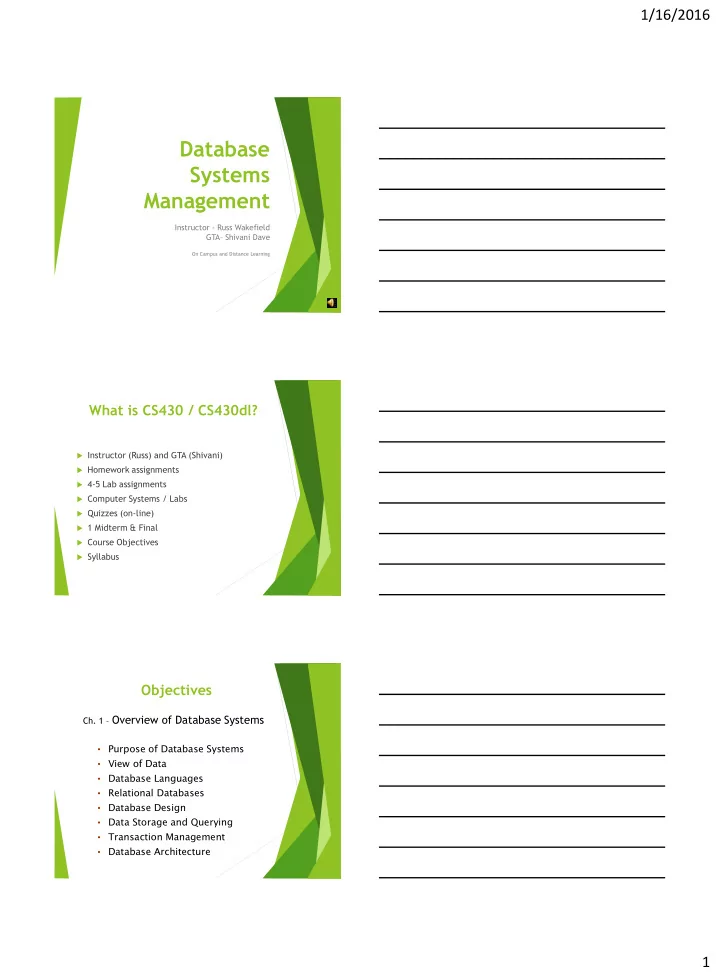

1/16/2016 Database Systems Management Instructor - Russ Wakefield GTA – Shivani Dave On Campus and Distance Learning What is CS430 / CS430dl? Instructor (Russ) and GTA (Shivani) Homework assignments 4-5 Lab assignments Computer Systems / Labs Quizzes (on-line) 1 Midterm & Final Course Objectives Syllabus Objectives Ch. 1 – Overview of Database Systems Purpose of Database Systems • • View of Data Database Languages • Relational Databases • Database Design • Data Storage and Querying • Transaction Management • Database Architecture • 1
1/16/2016 Objectives Ch. 2 – Introduction to Relational Model Structure of Relational Databases • Database Schema • • Keys Schema Diagrams • Relational Query Languages • Relational Operations • Objectives Ch. 3 - Introduction to SQL Overview of the SQL Query Language • SQL Data Definition • • Basic Structure of SQL Queries • Set Operations Null Values • Aggregate Functions • Nested Subqueries • Modification of the Database • Objectives Ch. 4 – Intermediate SQL • Join Expressions • Views • Transactions • Integrity Constraints • SQL Data Types and Schemas • Authorization 2
1/16/2016 Objectives Ch. 5 – Advanced SQL • Accessing SQL From a Programming Language Functions and Procedures • Triggers • Recursive Queries • Advanced Aggregation Features • Objectives Ch. 6 – Formal Relational Query Languages Relational algebra • Relational calculus (maybe) • Objectives Ch. 7 – Database design and the ER model Overview of the Design Process • The Entity-Relationship Model • Constraints • Removing Redundant Attributes in Entity • Sets Entity-Relationship Diagrams • Reduction to Relational Schemas • Entity-Relationship Design Issues • 3
1/16/2016 Objectives Ch. 8 – Relational Database Design Features of Good Relational Designs • Atomic Domains and First Normal Form • Decomposition Using Functional • Dependencies Functional-Dependency Theory • • Algorithms for Decomposition Objectives Ch. 9 - Application Design Application Programs • Web Fundamentals • • Servlets and JSP Application Architectures • Rapid Application Development • Application Performance • Application Security • Encryption and Its Applications • Objectives Ch. 10 - Storage and File Structure Overview of Physical Storage Media • Magnetic Disk and Flash Storage • RAID • Tertiary Storage • File Organization • Organization of Records in Files • Data-Dictionary Storage • Database Buffer • 4
1/16/2016 Objectives Ch. 11 - Indexing and Hashing Basic Concepts • Ordered Indices • B+-Tree Index Files • B+-Tree Extensions • Multiple-Key Access • Static Hashing • Dynamic Hashing • Comparison of Ordered Indexing and • Hashing Bitmap Indices • Index Definition in SQL • Objectives Ch. 12 – Query processing Overview • Measures of Query Cost • Selection Operation • Sorting • Join Operation • Other Operations • Evaluation of Expressions • Objectives Ch. 14 - Transaction Management Transaction Concepts • • A Simple Transaction Model Storage Structure • • Transaction Atomicity and Durability Transaction Isolation • Serializability • Transaction Isolation and Atomicity • Transaction Isolation Levels • Implementation of Isolation Levels • Transactions as SQL Statements • 5
1/16/2016 Objectives Ch. 17 - Concurrency Control Lock-Based Protocols • Deadlock Handling • Multiple Granularity • Timestamp-Based Protocols • Validation-Based Protocols • Multiversion Schemes 689 15.7 • Snapshot Isolation Insert Operations, Delete Operations, • and Predicate Reads Objectives Ch. 18 - Recovery To show what steps are taken in the ARIES • method to recover from DBMS crashes To describe how logs are maintained and • how they are used to recover from a crash To identify the concepts behind checkpoints • and show how they are used. • To show how recovery interacts with concurrency control Computer Systems / Labs Assignments done using computer systems in C120 (Linux based, multi-core boxes) May use home equipment – but GTA will grade using the state capital boxes. If it doesn’t run in that environment, it will be graded accordingly Department policy Every student enrolled in a CS class is given an account in the CS environment Our MySQL server is faure.cs.colostate.edu 6
1/16/2016 Homework / Programming Assignments Homework assignments every 1-2 weeks 4-5 lab assignments Done using the state capital machines SQL, design and build database Java program using the JDBC interface XML parser Late Policy Assignments are due class time on Tuesdays (both homework and lab) Assignments have a 48 hour late period. Assignments turned in during the late period will be assessed a 20% late penalty All assignments will be submitted through Canvas Questions about grading should first be discussed with Shivani Quizzes Weekly quizzes over the reading material 3 attempts Only highest attempt counts for grade Open book, open notes NOT open person 7
1/16/2016 Exams Midterm exam during week 7 Final exam during week 16 Series of timed online quizzes 72 hours Sunday, Monday, Tuesday Study guide will be published in advance Syllabus http://www.cs.colostate.edu/~cs430dl Where do I get help ? The book – reading is a good thing. Your classmates – this is a large class, find allies. Not TOO good of allies – cheating will be dealt with harshly.. The Instructor and GTA We have office hours, use them. Our salaries are paid by your tuition – you are entitled to our time. If our office hours are not timely – set up an appt. Like all geeks, we live glued to computer screens. 8
1/16/2016 Where do I get help? Discussion Board If you have a question, odds are 20 other people have the same question. The TA will check the boards regularly Google / Stack Overflow Again – not TOO much of Google, see above re: cheating Sharing code, posting code is considered cheating!! 9
Recommend
More recommend